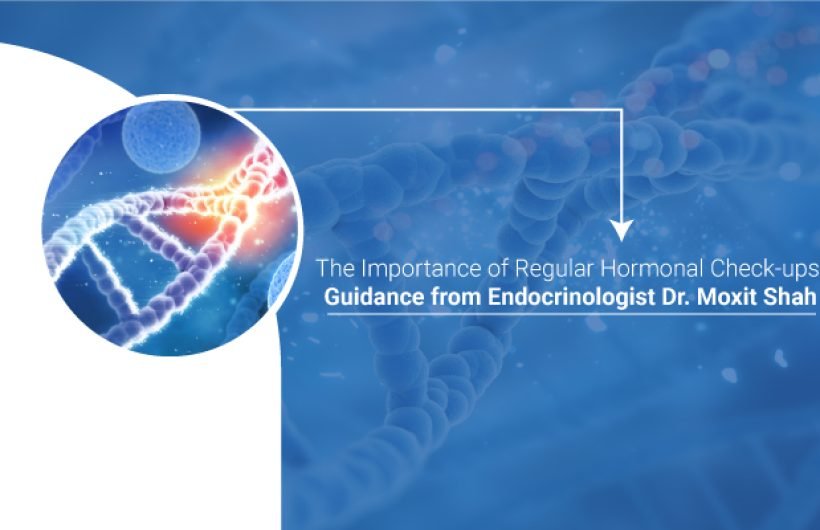Hormones play a crucial role in regulating many of our body’s functions, from growth and metabolism to mood and reproductive health. When these hormones are not balanced, it can cause various health problems. That’s why regular hormonal check-ups are essential for maintaining overall well-being. In this blog, we’ll explore the importance of these check-ups and get expert guidance from Dr. Moxit Shah, a renowned endocrinologist in Ahmedabad.
What Are Hormones and Why Are They Important?
Hormones are chemicals made by glands in the endocrine system that send messages through the body. They travel through the bloodstream to tissues and organs, where they control everything from energy levels and stress responses to reproductive cycles and growth. When hormones are balanced, the body works well. However, even a small imbalance can have significant effects on your health.
Common Hormonal Disorders
Several conditions can arise from hormonal imbalances. Some of the most common include:
- Diabetes: Caused by problems with insulin production or action.
- Thyroid Disorders: Such as hypothyroidism (when the thyroid isn’t active enough) and hyperthyroidism (when the thyroid is too active).
- Polycystic Ovary Syndrome (PCOS): Affects women’s hormone levels, leading to irregular menstrual cycles and other symptoms.
- Growth Disorders: Due to imbalances in growth hormone.
- Adrenal Disorders: Affecting the adrenal glands, which produce hormones like cortisol.
- Osteoporosis: Related to hormonal imbalances that affect bone density.
Why Regular Hormonal Check-ups Are Essential
- Early Detection of Problems: One of the main reasons for regular hormonal check-ups is early detection. Many hormonal disorders develop gradually, and symptoms can be subtle at first. Regular check-ups allow your endocrinologist to catch these issues early before they become more serious.
- Better Management of Chronic Conditions: For those already diagnosed with a hormonal disorder, regular check-ups are crucial for effective management. Conditions like diabetes and thyroid disorders require ongoing monitoring to ensure that treatments are working and to adjust them as needed.
- Prevention of Complications: Left untreated, hormonal imbalances can lead to serious complications. For instance, untreated diabetes can cause nerve damage, heart disease, and kidney problems. Regular check-ups help prevent these complications by ensuring that your condition is well-managed.
What to Expect During a Hormonal Check-up
A hormonal check-up usually involves several steps. Here’s what you can expect:
- Medical History and Symptoms: Your endocrinologist will start by asking about your medical history and any symptoms you’re experiencing. This helps identify any potential hormonal issues and determine the appropriate tests.
- Physical Examination: A physical exam can reveal signs of hormonal imbalances, such as changes in weight, skin condition, and blood pressure.
- Blood Tests: Blood tests are a key part of diagnosing hormonal disorders. They measure hormone levels in your blood and help identify any imbalances.
- Imaging Tests: In some cases, your doctor may recommend imaging tests, such as an ultrasound or MRI, to examine glands like the thyroid or adrenal glands.
- Discussion of Results and Treatment Plan: Once the tests are complete, your endocrinologist will discuss the results with you and develop a treatment plan if necessary. This may include medication, changing your lifestyle, or further testing.
How Often Should You Have a Hormonal Check-up?
The frequency of hormonal check-ups depends on your risk factors and health status. Here are some general guidelines:
- Healthy Adults: Every 1-2 years for a general check-up.
- People with Known Hormonal Disorders: More frequent check-ups, as recommended by your doctor.
- Women Over 40: Regular check-ups to monitor for conditions like menopause and thyroid disorders.
- Individuals with a Family History of Hormonal Disorders: Regular screenings, even if you don’t have symptoms.
Dr. Moxit Shah’s Expert Advice on Hormonal Health
Dr. Moxit Shah, a leading endocrinologist in Ahmedabad, emphasizes the importance of proactive hormonal health. Here are some of his key recommendations:
- Stay Informed: Understanding your body and the role of hormones can help you recognize early signs of imbalance. Dr. Shah encourages patients to educate themselves about hormonal health and ask questions during their check-ups.
- Maintain a Healthy Lifestyle: A balanced diet, regular exercise, and adequate sleep are crucial for hormonal balance. Dr. Shah advises patients to adopt a healthy lifestyle to support their endocrine system.
- Manage Stress: Chronic stress can disrupt hormone levels and lead to various health issues. Techniques like meditation, yoga, and deep breathing can help manage stress and promote hormonal balance.
- Follow Your Doctor’s Advice: If diagnosed with a hormonal disorder, it’s essential to follow your doctor’s treatment plan. Dr. Shah stresses the importance of medication adherence and regular follow-ups to manage conditions effectively.
Common Myths About Hormonal Health
Myth 1: Hormonal Imbalances Only Affect Women
While hormonal changes during menstruation, pregnancy, and menopause are well-known, men can also experience hormonal imbalances. Conditions like low testosterone and thyroid disorders affect both genders.
Myth 2: Hormonal Issues Are Always Obvious
Symptoms of hormonal imbalances can be subtle and easily mistaken for other issues. Regular check-ups are crucial for detecting these problems early.
Myth 3: Natural Remedies Can Replace Medical Treatment
While lifestyle changes and natural remedies can support hormonal health, they should not replace medical treatment for diagnosed conditions. Always follow your doctor’s recommendations.
The Role of Endocrinologists
Endocrinologists are experts who diagnose and treat hormonal problems. They have extensive training in the endocrine system and are best equipped to manage complex conditions. Dr. Moxit Shah and other endocrinologists play a vital role in helping patients achieve optimal hormonal health.
Conclusion
Regular hormonal check-ups are essential for maintaining overall health and well-being. They allow for early detection and effective management of hormonal imbalances, preventing serious complications. By staying informed, adopting a healthy lifestyle, and following expert advice, you can ensure that your endocrine system functions smoothly.
For personalized advice and expert care, consult with Dr. Moxit Shah, a leading endocrinologist in Ahmedabad. With his guidance, you can take proactive steps to maintain your hormonal health and enjoy a better quality of life.






